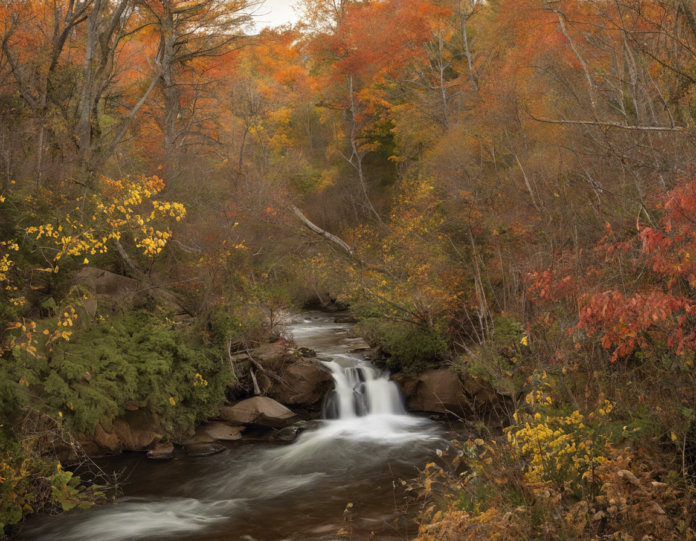Introduction
Fall River, located in the heart of Massachusetts, offers an abundance of natural beauty and resources that have been utilized for centuries for their medicinal properties. From native plants to tranquil landscapes, the city provides a rich tapestry for those seeking to explore the healing powers of nature. In this article, we will delve into the various plants and natural elements found in Fall River that have been traditionally used for medicinal purposes, as well as how modern science is rediscovering their benefits.
Native Plants for Medicinal Use
Fall River is home to a diverse array of native plants that have long been utilized by indigenous peoples for their healing properties. One such plant is Echinacea, known for its immune-boosting abilities and use in treating colds and flu. Goldenseal is another native plant that has been traditionally used as a natural antibiotic and anti-inflammatory agent. Its root contains berberine, a compound with powerful medicinal properties.
Fall River’s Healing Waters
In addition to its plant life, Fall River is also blessed with healing waters that have been revered for their therapeutic qualities. The Quequechan River that runs through the city was historically believed to have cleansing and purifying properties. While modern science may not support these claims, the soothing sound of flowing water and the tranquility of riverside walks can have undeniable mental health benefits.
Exploring Nature Reserves
Nature reserves in Fall River, such as Freetown-Fall River State Forest and Copicut Woods, offer an opportunity to connect with nature and reap its medicinal benefits. Engaging in activities such as hiking, forest bathing, and birdwatching can reduce stress, improve mood, and boost overall well-being. The phytoncides released by trees in these reserves have been shown to enhance the immune system and reduce blood pressure.
Modern Science Meets Traditional Remedies
While traditional knowledge of medicinal plants and natural remedies has been passed down through generations, modern science is now catching up to validate their effectiveness. Research on herbs like St. John’s Wort, commonly found in Fall River, has shown its potential in treating depression and anxiety. Essential oils extracted from plants like lavender and eucalyptus have been scientifically proven to have calming and decongestant effects.
Holistic Healing Practices
Holistic healing practices, such as yoga and meditation, are also gaining popularity in Fall River as people seek natural and non-invasive ways to enhance their health. Yoga, with its focus on breath control and mindful movement, can improve flexibility, reduce stress, and promote mental clarity. Meditation, on the other hand, has been shown to lower blood pressure, improve sleep, and boost mood.
Incorporating Nature’s Medicine into Daily Life
There are various ways to incorporate nature’s medicine into your daily life in Fall River. Herbal teas made from plants like chamomile and peppermint can provide relaxation and digestive support. Aromatherapy using essential oils can create a calming atmosphere at home or work. Even outdoor activities like gardening or nature walks can have profound benefits for your physical and mental well-being.
Conclusion
Exploring nature’s medicine in Fall River can be a rewarding journey that not only enhances your health but also deepens your connection with the natural world. Whether you choose to explore native plants, healing waters, nature reserves, or holistic practices, the city offers a wealth of resources for you to tap into. By integrating these natural elements into your daily routine, you can experience the profound healing benefits that Fall River’s natural environment has to offer.
Frequently Asked Questions (FAQs)
1. Are all native plants in Fall River safe for medicinal use?
While many native plants in Fall River have traditional uses, not all of them are safe for medicinal purposes. It is essential to research and consult with experts before using any plant for its medicinal properties.
2. How can I differentiate between a medicinal plant and a poisonous one?
Identifying plants accurately is crucial when using them for medicinal purposes. Consider taking a botany course or consulting with a local herbalist to learn how to distinguish between different plant species.
3. Can I forage for medicinal plants in public parks in Fall River?
It is important to check local regulations and obtain permission before foraging for plants in public parks. Some areas may have restrictions on collecting plant material to preserve the ecosystem.
4. Are there any risks associated with using herbal remedies from Fall River?
Like any form of medicine, herbal remedies can have side effects and interactions with certain medications. It is advisable to consult with a healthcare provider or herbalist before incorporating new remedies into your wellness routine.
5. How can I support conservation efforts for native plants in Fall River?
To protect native plants and their habitats, consider volunteering with local conservation organizations, supporting sustainable farming practices, and advocating for the preservation of green spaces in the city.
6. Are there any guided walks or workshops on medicinal plants in Fall River?
Check with local botanical gardens, nature reserves, or community centers for guided walks, workshops, or classes on medicinal plants in Fall River. These opportunities can provide valuable insights into the local flora and its traditional uses.
7. Can I grow medicinal plants at home in Fall River?
Many medicinal plants can be grown successfully at home in Fall River, either indoors or outdoors depending on the plant’s requirements. Consider starting with easy-to-grow herbs like basil, mint, or lemon balm for your home garden.
8. How can I ethically harvest medicinal plants in Fall River?
When harvesting medicinal plants in Fall River, ensure that you do so sustainably and ethically. Follow guidelines such as not over-harvesting, leaving some plants for wildlife, and respecting private property rights.
9. Are there any local herbalists or practitioners in Fall River who specialize in natural medicine?
Seek out local herbalists, naturopaths, or holistic health practitioners in Fall River who specialize in natural medicine. They can provide expert guidance on using medicinal plants and holistic remedies for your well-being.
10. What resources are available for learning more about nature’s medicine in Fall River?
Explore books, online resources, workshops, and community events focused on herbalism, traditional medicine, and nature-based healing in Fall River. Joining local plant walks or herb workshops can deepen your knowledge and connection with nature’s medicine.









